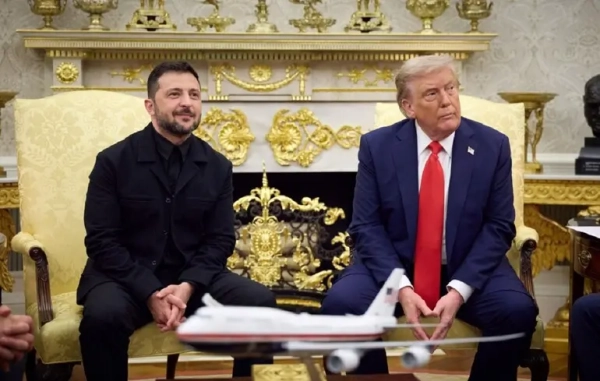
Attorney General Jeff Sessions’s firing wasn’t shocking. And that, on some level, should shock us.
For months now, President Trump had been humiliating his top law enforcement official, belittling him in public and yelling at him in private, in a clear attempt to force his resignation. Practically everyone in Washington had assumed Sessions would be gone after the midterms; it turns out Trump couldn’t even wait a full day after the polls closed to pull the trigger.
The result of this buildup is that much of the country seems to be treating this as a foregone conclusion. The New York Times reported, for example, that “it came as little surprise when Mr. Sessions resigned the day after the midterms were over.” This is an entirely accurate assessment, but also a troubling one.
The truth is that Trump firing Sessions, and temporarily replacing him with a loyalist named Matthew Whitaker who has publicly denounced the special counsel investigation, should scare us. It should inspire surprise and anger on the level of the James Comey firing in May 2017, which much of Washington treated as a serious crisis for American democracy. In both cases, the president is nakedly asserting power over the direction of an investigation, sacking people in clear efforts to block oversight of his own conduct.
But this time, the panic is more muted. Democrats are objecting, of course, as are some Never Trump conservatives. But this simply hasn’t had the earth-shattering impact that the Comey firing did. The fact that Trump had been signaling this move normalized it, routinized it, made it thinkable. (It probably didn’t help that he did it the day after the midterms.)
And this, slowly but surely, is how the threat to American democracy has kept growing during the Trump era. Actions that were inconceivable or abhorrent prior to 2016 have become accepted parts of our everyday reality. They’re just facts of life in a country governed by Trump’s Republican Party.
The ship of American state is being replaced
Imagine a ship made of wooden planks. The more the ship is used, the more its planks get damaged; one by one, they get replaced. If this goes on for long enough, eventually all the ship’s planks will have been replaced, meaning that it contains exactly none of the wood it started out with. At what point, if ever, does it stop being the same ship?
This basic setup comes from a thought experiment called the Ship of Theseus, which dates back to ancient Greek philosophy. It was designed to illustrate tricky questions about the metaphysics of identity, but it also provides a nice way of thinking about Trump’s degradation of the American political system.
The Robert Mueller investigation grew out of the firing of FBI Director Comey, a way of protecting the Trump-Russia investigation from presidential interference. Since day one, Trump has been raging against Sessions, who recused himself from overseeing the probe, demanding that he either take control of the investigation or resign and let someone else do it.
Ever since then, Trump has repeatedly violated the norms governing the way the president should treat the attorney general and the Justice Department. He admitted that the Comey firing was about the Russia investigation on national television. He suggested the attorney general’s job should be defending the president, not investigating him. He blasted the “Jeff Sessions Justice Department” for bringing charges against Republican members of Congress before the midterms because it might jeopardize Republican chances to hold the House.
Each of these, individually, shatters longstanding norms about how the president is supposed to talk and think about the Department of Justice. But it’s harder to muster outrage about each one individually. Disturbing as these incidents are, no single one constitutes the end of American democracy, or even of the DOJ’s independence.
These little norm violations are more like replacing planks of the ship of state, each one individually not making a big difference but cumulatively amounting to a major change in the way the president gets to treat an agency that’s supposed to be a check on his power.
The same thing happened, in microcosm, with the Sessions firing. Trump’s berating of the attorney general in public, the insults, the regular humiliations — no single one was enough to incite intense public outrage, but they served together to construct a new normal when it comes to the president’s relationship with the attorney general.
By the time we got to the actual firing and replacement with a loyalist, it felt less like a novel event and more like the inevitable result of an ongoing process.
The Sessions firing shows how democratic backsliding is possible
Since Donald Trump’s election, there’s been a flowering of scholarship on the threat to democratic institutions in Western societies. Yascha Mounk, a senior fellow at New America, has unearthed data suggesting flagging support for democracy in some Western countries. Political scientists Steven Levitsky and Daniel Ziblatt document warning signs — like rising partisan rancor — that have plagued and doomed democracies in the past. And William Galston of the Brookings Institution argues that rising inequality has made a populist anti-democratic backlash more likely.
I’ve always run up against a stumbling block while reading this work. It’s easy to understand the theory — that democracy’s foundations are weakening — but harder to see in practice how a democracy like the United States would actually collapse. The idea of a military coup just seems absurd; so too does Congress giving dictatorial power to President Trump. Democracy here is too well-established, and too popular, to be openly demolished in the way that Adolf Hitler ended the Weimar Republic.
A much scarier possibility, one you’ve seen in countries like Hungary and Venezuela, is a piece-by-piece dismantling of democratic systems. Instead of doing everything in one go, and making a show of suspending the Constitution, you pass a series of laws that amount over time to the destruction of democracy.
In Hungary, Prime Minister Viktor Orbán has spent the past eight years setting up a system that resembles a democracy but isn’t actually one. He didn’t abolish elections, but he gerrymandered parliamentary districts and seized control of the civil service that administers elections. He didn’t ban the free press, but he either bought up critical publications or forced them to sell to government-friendly allies. This didn’t all happen immediately, but rather bit by bit since Orbán took office in 2010. There was never a specific moment in time when you could say, “Aha, now Hungary isn’t a democracy” — it just evolved, over time, into something different and unfree.
This is what makes Trump’s approach to firing Sessions such a worrying moment.
It really is the case, as New York magazine’s Jonathan Chait points out, that this is a serious threat to the health of American institutions. Even if acting Attorney General Whitaker doesn’t fire Mueller straightaway, it’s possible that he could hamstring the probe behind the scenes through bureaucratic tools like refusing to approve Mueller’s indictments and subpoenas. Indeed, Whitaker has even publicly floated the idea of cutting probe funding. He could run the same playbook — small fights rather than a major confrontation — that helped him assume office without a huge public fuss.
The president, knowingly or not, is exploiting a weakness in the democratic immune system. Democracies depend on a motivated and involved public for their survival. But if politicians only take one small legalistic step away from democracy at a time, each one narrow enough to be justifiable to their political allies, then a systematic shift away from democracy and constraints on presidential power never ends up truly galvanizing the opposition. If you don’t give the people a crisis point to rally around, you can get away with a lot.
You might even have experienced this firsthand reading this article. When I suggested at the beginning of this piece that this was a threat to democracy, you, reader, might have thought it was a bit hyperbolic.
But that’s exactly the problem: The slow degradation of institutions, the normalization of an authoritarian approach to politics, makes any warning about a particular development seem out of proportion to the immediate threat. But we need to be honest about the big picture: Donald Trump’s approach to politics, including his public flagellation and eventual firing of Jeff Sessions, really is damaging the foundations of American democracy.
Sourse: vox.com






